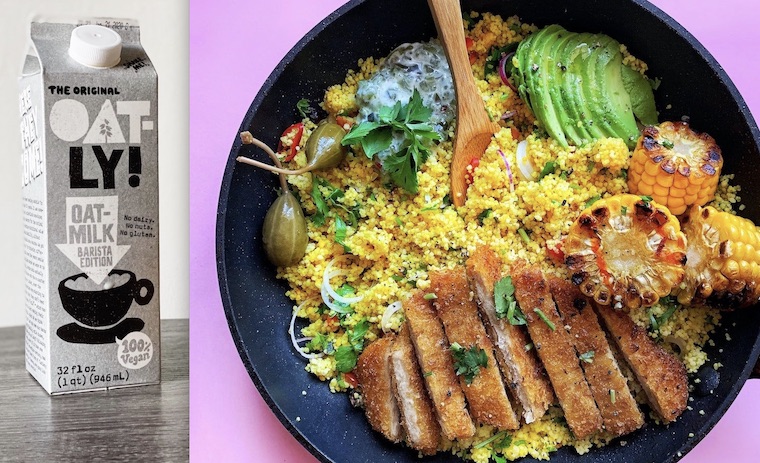
A Vegan Health Article from All-Creatures.org
See All-Creatures.org Health Position and Disclaimer
'Plant-Based' And ‘Oat Milk’ Added To The Merriam-Webster Dictionary
From
SpeciesUnited.com
October 2022
As the dairy and meat industries argue that “oat milk” and “plant-based
meat” should not be used to prevent public confusion, the dictionary’s
adoption of these new terms may help companies keep their labels and prevent
the restriction of names certain products being limited only to those that
are animal-derived.

The new terms reflect the growing uptake in plant-based diets and sustainable food choices.
The words “plant-based” and “oat milk” have been officially added to the
Merriam-Webster dictionary in a move that publicly acknowledges the rise of
vegan eating.
The terms were added alongside 368 others and will join “pumpkin spice” in
the dictionary’s food category. “Names of foods from around the world become
familiar to us through menus, recipes, and cooking shows,” stated
Merriam-Webster. “But homegrown flavors—particularly one that’s become
(in)famously associated with autumn—also give us new words that need to be
defined.”
Additionally, the iconic dictionary, which has been at the forefront of
words and language information for around 194 years, has also added
“greenwashing.” This is the act of making a product, policy, activity, etc.
appear to be more environmentally friendly or less environmentally damaging
than it really is. Other terms include “booster dose,” “sus,” and “lewk.”
Merriam-Webster has been publishing dictionaries since 1847 and launched its
online version in the 1990s. To discover words to add to the dictionary, the
editors carefully monitor which words people use most often and how they use
them via social media, websites, media outlets, and more. The addition of
“plant-based” and “oat milk” highlights the growing popularity of these
terms within the public conversation.
“Some of these words will amuse or inspire, others may provoke debate. Our
job is to capture the language as it is used,” said Peter Sokolowski, Editor
at Large for Merriam-Webster. “Words offer a window into our ever-changing
language and culture, and are only added to the dictionary when there is
clear and sustained evidence of use.”
The first-known use of the world “plant-based” occurred in 1960, according
to Merriam Webster. The dictionary defines two meanings for the term: the
first is when something is “made or derived from plants”, such as a
plant-based burger or protein, while the second when something consists
“primarily or entirely of food (such as vegetables, fruits, nuts, oils, and
beans) derived from plants”.
Meanwhile, Merriam-Webster defines “oat milk” as "a liquid made from ground
oats and water that is usually fortified (as with calcium and vitamins) and
used as a milk substitute."
As the dairy and meat industries argue that “oat milk” and “plant-based
meat” should not be used to prevent public confusion, the dictionary’s
adoption of these new terms may help companies keep their labels and prevent
the restriction of names certain products being limited only to those that
are animal-derived.
The rise of “plant-based”
The rise of plant-based eating has increased tremendously over the last
few years as consumers look to protect the earth, animals and their own
health through their food choices. The Guardian estimates that there are 79
million vegans around the world and a 2022 study found that 1 in 10
Americans - a record number - say they no longer eat meat.
Plant-based foods offer an alternative to people who want to reduce their
impact but still consume foods that have a similar taste and texture to
traditional animal products. This growing demand has led to a surge of
plant-powered items on supermarket shelves, from meats and fish to milks and
cheeses, and according to the Good Food Institute, the sales of plant-based
foods grew three times faster than overall food sales in 2021.
Our choices matter to animals.
Return to Vegan Health Articles
All-Creatures.org Health Position and Disclaimer
We began this archive as a means of assisting our visitors in answering many of their health and diet questions, and in encouraging them to take a pro-active part in their own health. We believe the articles and information contained herein are true, but are not presenting them as advice. We, personally, have found that a whole food vegan diet has helped our own health, and simply wish to share with others the things we have found. Each of us must make our own decisions, for it's our own body. If you have a health problem, see your own physician.







